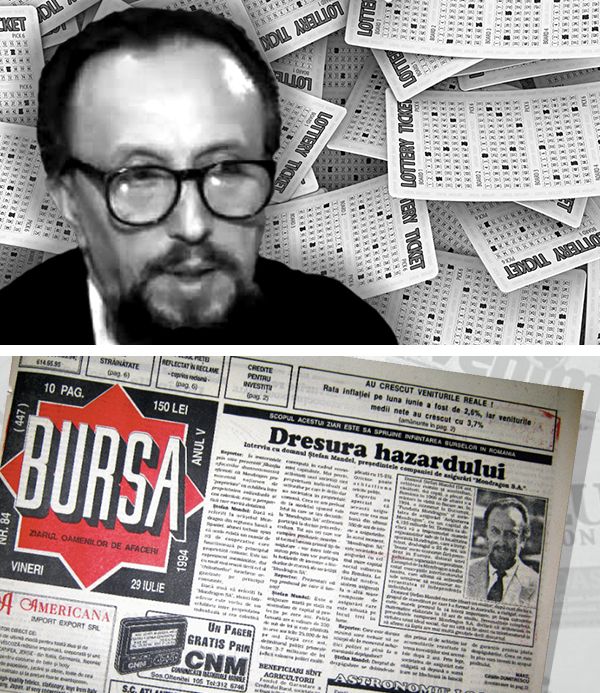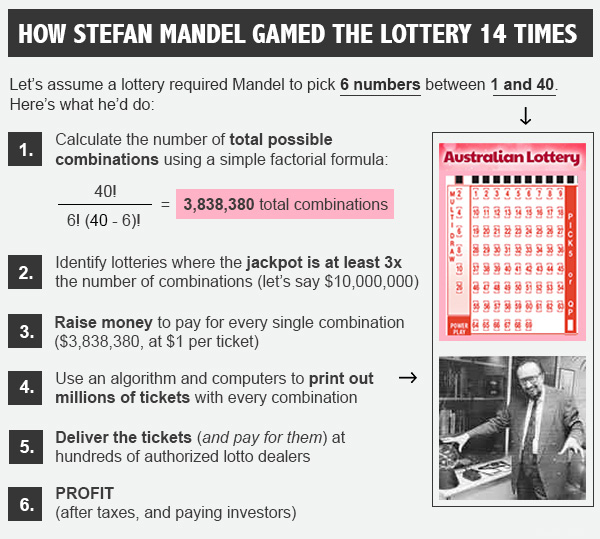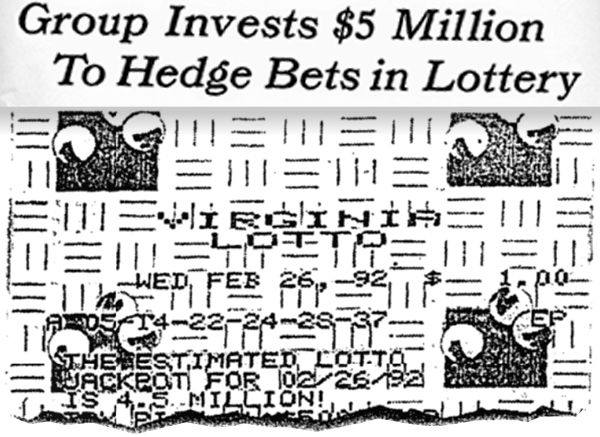Just after 11 PM on February 15, 1992, a lottery ball machine at the Virginia State Lottery HQ spit out 6 winning numbers on live television: 8... 11... 13... 15... 19... 20.
In the coming days, officials would find out that one "person" had secured not only the $27,036,142 jackpot, but 6 second prizes, 132 third prizes, and 135 minor prizes collectively worth another $900k.
What unfolded next was the strangest, most improbable lottery tale in history — one involving thousands of international investors, dozens of complex computer systems, and a mathematical savant who'd masterminded the entire operation from the other side of the world.
This is the story of the man who "gamed" the lottery by buying every possible combination.
One way out
In the late 1960s, a young Romanian economist named Stefan Mandel was struggling to get by.
At the time, Romania was under oppressive Communist rule, a period marred by poverty, job and food shortages, and "profound misery." Mandel's salary of 360 lei (US$88) a month was not enough to support his wife and two children, and, as he later told Planet Money, he needed a way to "get some serious money, quickly."
Many Romanians in Mandel's predicament had, out of necessity, turned to lives of crime. But Mandel, a self-described "philosopher-mathematician," saw another way out: The lottery.
Let's take a step back here: What kind of idiot banks on winning the lottery? You're literally more likely to win an Olympic gold medal, have identical quintuplets, or get crushed by a vending machine.
Well, Mandel wasn't just any guy — he was a natural with numbers who spent every spare minute analyzing theoretical probability papers written by the 13th-century mathematician Leonardo Fibonacci. And, after years of research, he wrote a "number-picking algorithm" based on a method he dubbed "combinatorial condensation."
"I'm a weekend mathematician, an accountant without too much education," he later told a Romanian magazine. "But mathematics properly applied can guarantee a fortune."
Using the algorithm, Mandel claimed he could accurately predict 5 of the 6 winning numbers, reducing the number of combinations in a lottery from millions to mere thousands. With a band of friends and acquaintances, he took a big risk and purchased large blocks of lottery tickets with the combinations his formula has deemed to be most likely.
Miraculously (and with a lot of luck), he won the first prize of 78,783 lei (about US$19.3k). After expenses, he walked away with $4k, enough to bribe foreign ministry officials and flee Romania for a new life — and a bigger jackpot.
Turning lottery wins into a business
After 4 years of roaming around Europe, Mandel settled in Australia and he set out to game the lottery in a different way.
In the typical lottery, a set of numbers within a certain range (say, 1-50) are randomly selected; if yours match in any order, you win the jackpot. The chances of winning are based on the number of possible combinations of these numbers, often in the millions.
But Mandel caught on to something: In certain lottos, the total number of possible ticket combinations was significantly lower than the jackpot.
For example, let's say a lottery required 6 picks of numbers between 1 and 40. This would yield 3,838,380 possible number combinations (calculator here). Now, let's say that same lottery had a $10 million jackpot. In theory, Mandel could buy a ticket for every single combination at $1 each and be guaranteed a win — and, after taxes, a decent profit.
Mandel maintained that "any high school math student could calculate the combinations." But this method came with some major logistical setbacks. How would he get the capital? And how could he possibly fill out hundreds of thousands of tickets, number by number?
Over a period of years, while working a day job as an insurance agent, Mandel convinced hundreds of investors to pool their money together and create a "lotto syndicate." He then developed a full-fledged automation system: A room full of printers and computers running on an algorithm that pre-populated tickets with every combination.
Computers revolutionized Mandel's process. Before, he'd been limited to writing out millions of combinations by hand, where a single mistake could ruin 8 months' worth of work; now, he could outsource the work to a machine.
Throughout the 1980s, Mandel's syndicate would wait until a jackpot ballooned to an amount higher than the total combinations, then "move to buy" thousands of tickets. They managed to win 12 lotteries (and rake in 400k smaller prizes) across Australia and the UK.
"Everyone said to me: You can not, you will not succeed! " Mandel told a Romanian newspaper at the time. "Now, the voices that have long [cast me as] a dreamer have been silenced."
But Mandel's system soon hit a wall.
For one, the profits were relatively modest (in $1.3 million 1987 win, he pocketed $97k after paying taxes and investors). His repeated wins also attracted the attention of Australian lottery authorities, who changed the law multiple times: by the end of the '80s, they'd outlawed both computer-printed tickets and bulk purchasing of tickets by an individual.
So, he set his sights on much bigger feat — one that would make international headlines and boggle the minds of lottery officials around the world.
The $27 million Virginia jackpot
Using his profits, Mandel planted "scouts" all over North America (Montreal, Boston, Miami, Phoenix, Norfolk), and compiled a list of historical lotteries with jackpots that were at least 3x the total of all possible combinations.
After considering Massachusetts ($37 million jackpot to 9 million combinations), and Arizona ($11 million to 5.1 million), he ultimately pinpointed the Virginia Lottery.
Virginia's lottery offered several advantages. It was fairly new, and allowed buyers to purchase tickets in unlimited quantities and print them at home. But most importantly, its numbers only ranged from 1 to 44 (other states went as high as 54). This meant that with 6 picks, there were "only" 7,059,052 possible combinations, compared to the usual 25m+.
Under the shell corporation Pacific Financial Resources, Mandel set up a trust called the International Lotto Fund (ILF) and convinced 2,524 investors to put at least $3k each in the pot.
Given Mandel's prior successes, the demand was hot: He raised more than $9m.
In a Melbourne warehouse, he set up 30 computers and 12 laser printers, and hired 16 full-time employees to print 7m tickets pre-populated with every combination — a process that took 3 months. He then shipped the one-tonne of paper weight to a point-person in the US at a cost of $60k.
With the tickets secured in Virginia, Mandel had to wait until the jackpot hit a number that would make financial sense after taxes, overhead, and paying off investors.
A state lottery prize typically begins in the low millions and increases every time a drawing goes by with no winner. (When you see those insane $758m jackpots, it means nobody has won in quite some time.) Mandel had to anticipate when to strike, and had to hope for the best that there wouldn't be multiple winners to dilute the pot and ruin his margins.
On February 12, 1992, the Virginia Lottery jackpot hit $27 million. Mandel's team on the ground was given a simple directive: Go.
With that, they had 72 hours to pull off a logistical miracle. And nobody — not even Mandel — could've anticipated the the madness that would ensue.
This concludes PART 1. Tune in next week to catch PART 2 (and some extra material you won't want to miss).
 (Click to display full-size in gallery)
(Click to display full-size in gallery)






I cannot wait until Part 2.
This is a truly heartwarming story. The thing that caught my eye was the NAYSAYERS. They can crawl back under the rock where they came from. He proved them wrong BIG TIME.
Can hardly wait for part II!
I love the old computers, tape drives etc.
Youtube video:
https://www.youtube.com/watch?time_continue=293&v=4TqFp0efLK0
The last paragraph made the hairs on my eyebrows rise up.
CONGRATS MY FRIEND!
"Winners never quit", and "Quitters never win!"
It's just an article. Yes I did read about him and the people who figured out the lottery. However, is there really a video out there. How about an algorythym?
After reading the article, l could not help thinking about The movie " The Imitation Game" of how Allan Turing collaborated with Gordon Welchman, to build a machine that broke the German Enigma code during WW2. Impressive.
"Mandel claimed he could accurately predict 5 of the 6 winning numbers, reducing the number of combinations in a lottery from millions to mere thousands."
Can anybody tell me about this lottery with so many numbers that after picking 5 numbers there are still thousands of other numbers to choose the 6th number from?
Read winsomelosesome's post on the replies, there is a link to the youtube video which is a good watch.
Method:
Buy every possible combination
If the jackpot exceeds the matrix of the game
jackpot of the game must exceed by a certain amount. Example, current jackpot $28 Million/Total sets = 7 million
He was not the only person to exploit the system. I believe there was a similar article posted here at Lotterypost.
Intriguing! I worked third shift, I should be asleep but I had to read this article. Goodnight!!
Todd you left me hanging! This is cruel and unusual punishment. Looking forward to part 2. Nice read. Lol!
Kudo's to him and his team ! I cannot wait to read the 2nd part ......
We all think about doing what he did when the jackpot gets high.